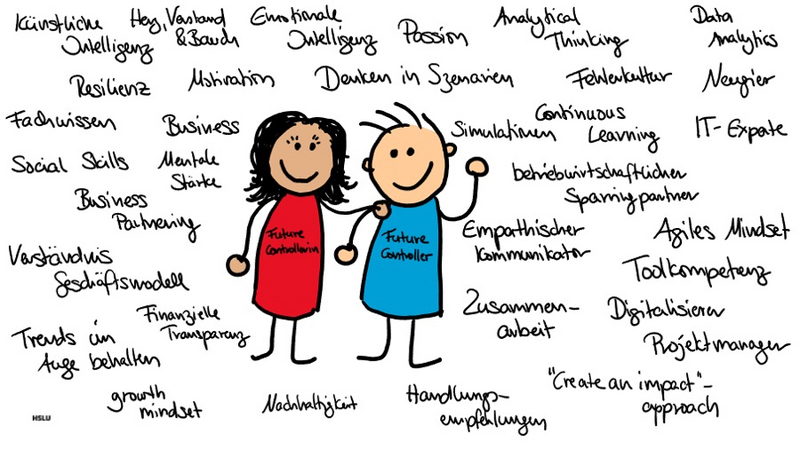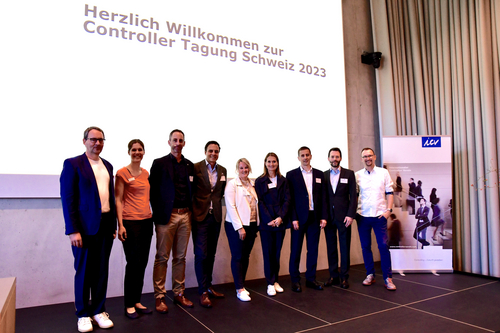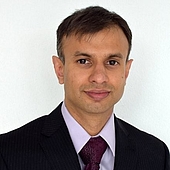CTS Controlling Conference Swizterland - Reports from the past events
Report 2023
The title of the Controlling Conference Switzerland 2023 was: “Future competencies in controlling: Prepared for the challenges of tomorrow”. This event offered a day full of valuable insights, experience reports, impulses and the opportunity to maintain old acquaintances and make new ones. The Controlling Conference 2023 was a sold-out event and definitely one of the highlights of our year. Below we would like to briefly summarize the core content of this event.
The opening speech was given by Markus Steiner, Member of the ICV Board, followed by a lecture by Prof. Dr. Ulrich Egle from the Lucerne University of Applied Sciences. The latter focused on the topic of Generative Artificial Intelligence (GKI), which is currently at the height of excessive expectations. Nevertheless, GKI has developed into a powerful tool in a short time, including in controlling. Egle called on controllers to accept the challenge, start with experiments and gain initial experience with GKI.
The first insight into the practical implementation was given by Martin Kühn from KIBAG Holding AG. He impressively illustrated how controlling in his company has been realigned and now works closely with the various departments. Martin sees the modern controller as a business sparring partner. He is not only a financial expert, but also a digitalization expert, an empathetic communicator and an energetic strategist who works “hands-on”. Or as Martin Kühn briefly summarizes the job description: Superman.
Katja de Groot-Altrichter from Victorinox AG took up many aspects of Kühn's presentation. She explained the transformation of the controller from Business Partner to Business Partner Plus. This is characterized not only by in-depth tool knowledge and affinity for digital topics and AI, but also by a deep understanding of business models and processes. These include social skills, emotional intelligence and an agile mindset. According to Katja de Groot-Altrichter, controllers are visionaries with heart, mind and gut.
For Daniel Britschgi from Lindt & Sprüngli, simulations and thinking in scenarios are integral parts of the modern controller skillset. Controllers should concern themselves less with backward-looking analysis and instead focus more on recommendations for action. Using two examples, Daniel impressively demonstrated how AI is already being used in controlling at Lindt & Sprüngli. He also emphasized the importance of soft skills: communication and emotional intelligence are essential success factors in controlling. Or as Daniel put it: The soft skills are the icing on the cake when it comes to controlling.
Christine Seibert and Adrian Bolliger from Dätwyler IT Infra AG looked at the modern controller from an HR and business perspective. They particularly emphasized analytical thinking and data analysis skills. It is of great importance to them that controllers develop further and acquire new skills. Recruiting is about recognizing existing potential. In your opinion, it is worth thinking outside the box and integrating new profiles into controlling.
In her subsequent lecture, Dr. Oliver Vogel from the Migros Cooperative Association also focused on data skills. For him, these are even more important than the actual specialist knowledge in controlling, as this can also be learned while working. The demand for data scientists is high, and Oliver emphasized that it is not just about what skills controllers have, but also what they want and what companies can offer.
Afterwards, the CTS sponsors presented their focus sessions. The focus was not only on the skills, but also on the required IT tools.
In the panel discussion, the speakers had the opportunity to present their perspectives in more detail and compare them with one another. They quickly agreed on the skills of the future controller. But there were differing opinions about how much pressure should be applied from the leadership.
Finally, Prof. Dr. Imke Keimer from Lucerne University summarized the event and offered an outlook. The demands on controllers are high and remain so. It is important to stay on the ball and continually educate yourself (lifelong learning, developing skills). This requires controllers to have a growing mindset, motivation and curiosity, as well as companies to move away from rigid structures and towards a culture of experimentation and error. This is a challenge, especially in controlling, as the reports must be error-free, but there should still be room for experiments. In addition to data skills, soft skills in particular are becoming increasingly important in controlling. Empathetic communication is particularly emphasized. Controlling is moving closer to management and the specialist departments. Controlling is at the table when important decisions are made.
The coffee breaks, lunch and the final apéro riche provided an opportunity for exchange. We really enjoyed this opportunity. Many thanks to all participants, speakers and sponsors. Thanks to your participation, CTS 2023 was a complete success. We look forward to welcoming you back to CTS 2024 in Rotkreuz next year.
Report 2022
The Controlling Conference Switzerland takes place on Wednesday, September 28, 2022, at the Institute for Financial Services Zug IFZ in Rotkreuz. Every year, the conference takes up current controlling topics and presents the participants with practical solutions. Both CFOs and controllers from practice are invited as well as researchers in the respective subject areas.
Interview by Prof. Dr. Imke Keimer with Prof. Dr. Ulrich Egle from Institute for Financial Services Zug IFZ from the Lucerne University of Applied Sciences and Arts and Markus Steiner, Board Member of the International Association of Controllers (ICV).
Imke Keimer: Since 2017, the Controlling Conference Switzerland has been held in cooperation between IFZ and ICV. The conference is very well attended every year - it is often fully booked. How can you explain the success?
Ulrich Egle: We offer an excellent exchange platform for controllers. Digital transformation, business analytics and sustainability are just a few examples that are changing the controlling function significantly. Many controllers are looking for impulses, solutions and, in particular, an exchange on how to make controlling future-proof and successful. Every year, companies present their best practice in the subject areas. In addition, the practical inputs are supplemented by relevant results from research. With great practical examples, we would like to give impulses and suggestions for successful sustainability initiatives in the finance and controlling departments at the Controlling Conference Switzerland.
Markus Steiner: The selection of the topic is of course a decisive factor every year. We are in constant exchange with our members and try to find out in advance which questions are relevant. We also benefit from our top-class speakers, who agree to share their knowledge every year and answer the questions of the controllers.
Imke Keimer: So far, the Controlling Conference Switzerland has dealt with topics such as digitization and agile finance. This year is about sustainability. Why did you choose this topic?
Ulrich Egle: The conservation of resources, the reuse of raw materials and the current energy crisis are leading to sometimes massive adjustments in the value chain. The design and management of the sustainability strategy required for this significantly expands the scope of tasks in controlling in all sectors. The success of the sustainability strategy depends on many, often new, factors. The right management parameters are crucial. That is why the management of sustainability is becoming increasingly important in the finance and controlling department.
Markus Steiner: When it comes to sustainability and controlling, the ICV is a pioneer; the “Green Controlling for Responsible Business” Expert Work Group has developed practical solutions since 2010. We are pleased to welcome two speakers from the Expert Work Group at the conference, who will also report to the Swiss controllers on their many years of experience. It is not enough to just set up and disclose sustainability reporting. Sustainability reporting itself is not yet an indicator of sustainable, successful business models. Some of the measurements are imprecise, not very standardized and therefore difficult to compare. The correct conclusions must be drawn from the information. A holistic management approach is required to successfully anchor sustainability controlling and thus create economic, ecological and social added value for the company.
Ulrich Egle: It can also be observed that companies find it difficult to analyze and, in particular, to compare sustainability indicators. The employees simply lack experience. For me, this is a great opportunity for controllers to get involved as a business partner in this area.
Report 2021
On October 27, the Controlling Conference Switzerland was held for the fifth time in cooperation between the ICV and IFZ (Institute for Financial Services Zug of the Lucerne University of Applied Sciences). After the conference last year took place in the online setting due to the corona pandemic, this year we could enjoy a bit of a return to normality, as the conference could be organized in presence in Rotkreuz.
In 2021, the organizers around Ulrich Egle and Markus Steiner put the focus on controlling, the backbone of the CFO in a crisis. Nils Hafner led the guests through the day of the conference as a moderator.
The opening speech was given by Christoph Hammer, independent consultant and CFO of SBB until September 2021. He drew attention to “SBB in stormy times - position determination”. The participants were given an insight into the areas of tension between “economic efficiency” and “public service” and how SBB's performance management responded to this: 9 performance management principles were defined in order to counter the crisis. Finally, Christoph Hammer summarized the organization's learning - what worked well and what didn't - as well as his personal "take-aways".
Dr. Olivier Vogel, Head of Finance Operations at the Migros Cooperative Association, showed how well “financial performance management and agile management” go hand in hand at the Migros Cooperative Association. The advantages of the agile world, but also the points of tension between the classic and the agile world, were presented as well as the personal learnings. At the end of the exciting input, Olivier Vogel shared with the visitors his opinion that the transition from classic to agile will continue for a long time and in which direction the Migros Cooperative Association is going.
Stefan Küppers, CFO of Dosenbach-Ochsner AG, gave a lecture entitled "The strategic direction of finance in an omnichannel company". According to Küppers, the retail trade is undergoing profound changes, including at Dosenbach-Ochsner. He explained how finances can be strategically aligned in order to play a relevant role in digitization, efficiency and added value
The last presentation before lunch was given by Lukas Bieri, Head of Controlling and Fee Management at Zurich Airport. He gave a lecture on the subject of “financial management at Zurich Airport”. In the past ten years, controlling and the business area of Zurich Airport have been "rather boring", viewed since the last major slump in growth caused by the financial crisis in 2007. As a result of the corona crisis, Zurich Airport had to deal with the first two letters of VUCA - volatility and uncertainty - after a phase of constant growth lasting several years. Bieri showed how the financial management can react to this.
After the lunch break, the Conference continued with two expert inputs. Anne dos Santos Capela, investment manager in the Headoffice of the SIGNA Retail AG group, gave a lecture on corona crisis management in retail, an important topic for the Signa Retail Group. She showed how crisis management developed during the crisis, what role controlling has taken and what lessons learned were collected. Her most important advice for the participants of the CTS Controlling Conference Switzerland: always think as if you were in a crisis, because the consequences of implementing changes are never as strong as in a crisis.
The second expert input was given by Katarzyna Haller, Head of Controlling for popular magazines for Ringier Axel Springer Schweiz AG. The title of her presentation: «Crisis: the "new normal". Implications for controlling: processes, role, skills», and the resulting implications for controlling at Ringier. Haller explained how the controllers' processes, roles and skills were further developed in order to react adequately to the accelerated transformation of the media industry during the crisis.
We continued with Andreas Frank, CEO Switzerland SCOR, on the exciting topic of «Future of work». SCOR Switzerland had also taken care of this. For the reinsurer, the Covid-19 crisis was primarily an accelerator and game changer on the way to the new world of work. Frank explained the right mix and the successful entry to the participants and also drew attention to possible problems that can hinder progress.
This was followed by a wide range of topics from specialist to technical solution approaches, presented by the partners of the CTS in the Focus Sessions. Here, too, the participants received useful input.
The conference concluded with Lorenz Bärlocher, CFO and member of the management team at IWC Schaffhausen. He explained what influence corona had on the controlling processes, the organization and tools at IWC Schaffhausen, and what contribution controlling could make in the context of VUCA in the luxury goods industry.
ICV Board Member Markus Steiner summarized the conference day and invited to the aperitif riche for further discussions.
Interviews with the speakers of the conferencje 2021
Crisis: the "new normal". Implications for controlling: processes, role, skills
Markus Steiner, ICV Board Member, spoke to Katarzyna Haller, Team Leader Controlling Publishing at Ringier AG.
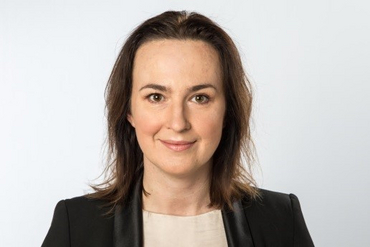
“Controlling as the backbone of the CFO in a crisis” is the title of CTS 2021 - how do you understand it?
In times of crisis, all finance departments are asked to work even closer together and to provide even better support to the CFO in decision-making. The top priority for our company was to secure liquidity. Controlling with the diversity of topics and business partners support the CFO in particular in developing a long-term view of liquidity. That's what makes it so exciting!
Opportunities and risks for the controller in this context - what predominates?
Definitely the chances from my perspective!
There are still a few weeks until the CTS at the end of October - what are you particularly looking forward to in this time?
Autumn is a very exciting phase for the controlling team at Ringier AG, between forecasting, budgeting and intensive exchange with business partners, I'm really looking forward to that!
Financial performance management and agile management - how do they get along?
Interview with Dr. Olivier Vogel, Head of Finance Operations at Migros-Genossenschafts-Bund and member of the Operations Department, conducted by Prof. Dr. Ulrich Egle, Lucerne School of Business, Institute for Financial Services Zug IFZ
To the Blog post – in GERMAN
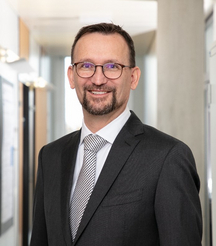
SBB in stormy times - position determination
Markus Steiner, ICV Board Member, spoke to Christoph Hammer, CFO SBB AG and member of the Group Management of the Schweizerische Bundesbahnen (Swiss Federal Railways).
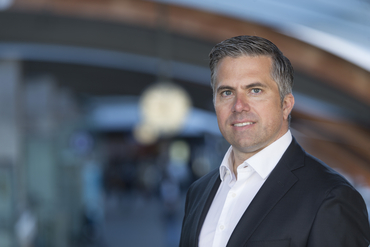
“Controlling as the backbone of the CFO in a crisis” is the title of CTS 2021 - how do you understand it?
The analogy with the backbone is always good. Especially in times of crisis, it is one of the key functions in order to orient SBB entrepreneurially and to address specific problems.
What will the main content of your presentation be for us participants?
First of all, I will shed light on the situation at SBB in the area of conflict between “economic efficiency” and “public service”. I will then go into the importance and possibilities of performance management in times of crisis and give selected insights into performance management at SBB.
What can the participants of the conference expect from your presentation?
In addition to impulses for those responsible for finances, there are also personal insights from the point of view of the CFO of SBB.
Opportunities and risks for the controller in this context - what predominates?
The controllers are not typical risk managers, but neither are they in good faith - so it is a “50:50 game”.
What are your next steps now?
We will sharpen the economic outlook for SBB and advance "a few other topics" - more on this in the speech.
What further development do you expect?
We expect a delayed return in mobility demand. In addition, the economic environment for public transport will be challenging (keywords: home office, public funds).
There are still a few weeks until the CTS at the end of October - what are you particularly looking forward to in this time?
With the SBB Finance Leadership Team, actively manage the effects of the COVID-19 crisis on SBB and its affiliated companies, but also position selected opportunities.
Financial management at Zurich Airport
Interview with Lukas Bieri, Head Controlling, Flughafen Zürich AG, by Prof. Dr. Ulrich Egle, Lucerne School of Business, Institute for Financial Services Zug IFZ
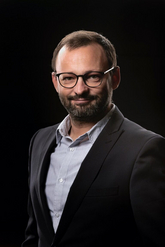
The strategic direction of finance in an omnichannel company
Interview with Stefan Küppers, CFO and member of the Dosenbach Ochsner AG management, by Prof. Dr. Ulrich Egle, Lucerne School of Business, Institute for Financial Services Zug IFZ
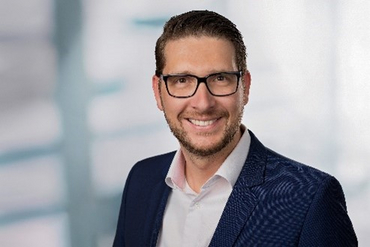
Corona and the influence on controlling
A statement from Lorenz Bärlocher, CFO IWC Schaffhausen
Controlling is not only the "backbone of the CFO in a crisis", but also the extended arm to perceive the crisis as an opportunity.
Financial management is an interlocking mechanism and every controller is part of this management.
In my speech at CTS 2021, I will show my view of this special time, combined with a few inspirations and thoughts for daily work.

Report 2020
„Management in an agile environment - The controlling toolbox must be expanded” was the topic and request of the Controller Conference Switzerland on September 30, 2020, again in cooperation with the Institute for Financial Services Zug IFZ. Due to the Covid-19 restrictions for the first time as an online conference, moderated by Prof. Dr. Nils Hafner.
100 participants visited the zoom conference and were very satisfied - again 100% recommendation rate, thank you very much!
Melanie Dieter, Diagnostics Finance Excellence (FinEx) Lead at Roche Diagnostics, started with Power of Communities. We learned how silos can be avoided, how you can build a strong, self-organized community and how promising collaboration can be created for agile collaboration. “Take the energy from the organization and strengthen it!”
From the ICV expert work group Agile Controlling, Marie-Luise Lehmann, head of the WG and founder of Finance Goes Agile, gave a speech on how agile methods can be used sensibly in controlling. We can now assess the context in which these can be valuable in controlling, namely primarily for complex issues. How to proceed and which additional controller’s skills are needed.
The ICV expert work group Digital CFO Agenda - Challenges and Solutions for Swiss Companies also presented insights into current work: Dr. Florian Hohmann, lecturer and project manager at the Institute for Accounting Controlling & Auditing at the University of St. Gallen, showed as Deputy Head of the expert work group, which topics are pursued with high priority by the participating Swiss companies. Where the science currently stands. And how to start with in the jungle of seemingly unlimited digitization possibilities: first increase efficiencies through RPA / automation, later the added value through business analytics and prediction.
Oliver Kretzler, Head of the Program Automation@Finances at SBB AG, presented findings on RPA at SBB: How does SBB Finance use robotics technology in the long term and effectively improve processes through automation? The employees' digi-check and “don't find a problem for a new tool / method, but vice versa!” was addressed.
Nicola Rotondo, Head of Controlling, Comet AG, highlighted in his lecture how digitization and agility can be designed in controlling itself and how controlling can support other company areas in agile work. “When it comes to speed, digitization helps, with adaptability -the agile attitude...” Beyond budgeting was an important element here; we also got to know the tough nuts and success criteria for this. "The planning has been debureaucratised and depoliticized."
Agility in controlling and ZKB is not a contradiction in terms, showed Dr. Roland Brun, Head of Controlling, Zürcher Kantonalbank. Also that agile is more than just a buzzword. ZKB radically realigned its bonus system in 2016 - abolished MBO - and now has many years of positive experience. Based on this, it has developed an approach to realign management and planning - to the requirements of an agilely organized and working change organization. "Agile@ZKB" describes the big picture as a living playbook and is constantly being further developed. In addition, one of the main challenges, "the planning ritual", was successfully addressed.
Agility and disruption through cloud & machine learning offered a look outside the box with Dr. Stefan Ebener, Manager Customer Engineering, Machine Learning at Google and Ali Vardi from the Google Cloud Team: Interesting AI/ML use cases for finance and controlling were presented, e.g. converting unstructured into structured data, understanding complex facts with "Document Understanding" and thereby automating processes. Machine readability and comprehensibility make it possible to identify correlations and anomalies, to check their validity and even to anticipate them. In order to identify further AI opportunities, it is necessary to close the “relevance gap” between traditional industries (“What can I do with AI?”) and the technologists (“I can solve any problem if I only know what the problem is”).
We then saw a wide range of topics in the focus sessions with the partners, from professional to technical solutions.
The panel discussion on the subject of "Agile work environment in Finance" with Corinne Häggi, Branch Manager Zug and Mandate Manager at Jörg Lienert AG as well as Melanie Dieter, Roland Brun and Ali Vardi rounded off the picture, including further insights into new profile requirements and the effects the recruiting processes.
Conclusion and outlook by Markus Steiner, ICV Board Member: “Management in an agile environment - the controlling toolbox must be expanded!” this call was clearly underpinned at this conference. Digital transformation and agile transformation are not fate, nor are they always hype, let alone a sure-fire success, whether in the company or in the controlling departments. They are opportunities for the controllers to take it into their own hands, to shape these new topics and to create new fields of activity.
At this conference, the participants could put new experiences in their toolbox, or at least feed on their wealth of ideas and inspirations.
At the ICV, we will continue to actively shape these very topical issues - with you, for example, in the regional and expert work groups or by participating in our conferences.
Join us!
Visit the picture gallery here for more impressions.
We’re looking forward to seeing you again at the next conference on October 27, 2021.
Report 2019
"Digital Controlling Excellence - Successful Digitization Projects in Controlling" was the title of the Swiss Controller Conference on 25.09.2019, again in cooperation with the Institute of Financial Services Zug IFZ. For the first time, the conference took place at the new IFZ location in Rotkreuz.
We were again pleased about a very well booked event and a 100% recommendation rate of the participants, thank you very much!
The digitization of controlling has picked up speed. The potential is being actively explored and implemented, as the many practical examples presented at this conference clearly demonstrated:
The participants were welcomed by Carmen Zillmer, Managing Director of the ICV and Markus Gisler, Director of the IFZ. The Head of the conference Prof. Dr. Ulrich Egle, Project Manager and Lecturer at the IFZ, and Markus Steiner, Regional Delegate of the ICV in Switzerland, welcomed the participants.
Ivo Gerig, Head of Digital Office at Siemens Smart Infrastructure, kicked off the launch with his presentation Digitization - Opportunities in Controlling. He showed e.g. how efficiency in reporting and forecasting can be achieved through standardization and automation. These productivity gains are a prerequisite to be able to use more resources for business partnering.
Dr. Markus Knaus, Finance & Controlling at ETH Zurich, reported on digitization at ETH Zurich - Electronic Workflows and Self Service Analytics. The participants could see which processes from HR, purchasing or accounts payable were digitized in which steps and which lessons in the history of the optimization of the reporting landscape can be learned.
Peter Scherrer, CFO, and Nicole Hecht, Project Finance from SIGA presented the speech Digitization with Business Intelligence and Business Analytics in Controlling where they showed the requirements and procedures of an SME with the example of an SME. With examples and an impressive live presentation of the tools, we could see how to progressively advance your organization in Davenport and Harris' maturity model to "Business Intelligence and Analytics".
It became somewhat more technical at the speech Blockchain and Controlling, presented by Thomas Ankenbrand, Head of Competence Center Investments at the IFZ. In addition to the clear-cut functionality of the distributed ledger technology, the participants were able to get ideas for use cases of DLTs in controlling. Basically, applications of blockchain in controlling would not be obvious and directly noticeable. However, the influence could be seen indirectly by implementing blockchain solutions in the companies, which could then influence and demand controlling accordingly.
RPA at an advanced stage of evolution was the topic of Daniel Turi, Head of Financial Data Management at Allianz Suisse: Robotics in Finance - Change with Enthusiasm. The participants were able to fully understand the enthusiasm and received tips on the implementation, talent development and organizational anchoring of RPA. Two statements were particularly remembered: "The best robotization ideas always come from the employees, not top down." And "technology itself is not crucial, but the mindset of employees is".
Urs Vanza, Head of Finance Innovation Lab at Schindler Management Ltd. presented in the last speech of the conference day on Finance innovation at Schindler and the added value for controlling. Schindler demonstrates its innovative strength not only in its products, but also in the finance sector: A holistic program was presented to us in selected key initiatives, derived from vision and strategy for the financial sector. Vanza went into more detail about RPA and the Global Reporting Platform.
Dedicated discussions of the participants were shown at the new interactive World Café, moderated by Ulrich Egle. Various topics of the conference were deepened in content and documented on flip charts. The insights and inputs from the previous speeches were some welcome food for thought and the subsequent discussion in the World Café.
Outlook and summary gave Markus Steiner, e.g. in a partly controversial discussion about the new role model of a controller in a digitized finance department, based on Heimo Losbichler, the Chairman of the ICV:
Controlling as a steering process will continue to be very important. Controlling is not information processing, and corporate management cannot be pressed into analytical forecasting software. The controller is the keeper for high leadership quality. In a successful company there have to be independent perspectives, rationality assurance, it needs the corrective: The cooperation between controllers and managers should create objectivity - an IT system will never be able to do so. The aim of digitization could therefore not be autonomous controlling, but assistence-based controlling. And this is already tangible in various facets.
See for yourself, visit the picture gallery.
We’re looking forward to welcoming you to the next conference in September 2020.
Interviews with the speakers of the conference 2019
Allianz Suisse: Robotics in Finance – Change with enthusiasm
Daniel Turi, Head of Financial Data Management at Allianz Suisse, spoke to Markus Steiner, ICV Regional Delegate Switzerland.
Mr. Turi, "Robotics in Finance - Change with Enthusiasm" is the title of your presentation at the Swiss Controller Conference 2019 - who is most enthusiastic about your robots?
My employees. They appreciate most of the advantages of robotics, giving them more time for value and quality tasks.
You are Head of Financial Data Management at Allianz Suisse, previously you worked many years as Accountant, Financial Controller and Business Controller. Are you and your team the frequently quoted „data scientist” that the controller should become?
Not quite. The Financial Data Management Team supports controllers and analysts with a variety of technologies and tools to help them better understand the role of the business partner and get the job done more efficiently.
The Team plays a key role in automating and robotizing the finance industry and optimizing financial processes. The goal is to ensure a transformation in activities, reducing repetitive tasks and saving more time for high quality tasks.
What can the participants of the conference expect from your presentation?
Many insights on how we started RPA at Allianz Suisse and finally anchored it in the organization. I will show why RPA is less about technology and more about employees. Further, I will introduce why many RPA initiatives are started in finance and how to get RPA into the organization - i.a. with the selection of suitable operating model - sustainable integration.
The practical exchange of experience from practice is very important to us - will you show, in addition to the positive findings, what did not go so well and what you would do differently today?
Yeah, no success without failure. I'll give you some suggestions on what to look for in a proof of concept and, once you have put the first robots into production, how to scale the initiative further.
What next steps have you planned?
Extension of knowledge management, scaling of RPA and greater integration of robots in daily activities. Knowledge Management is about establishing RPA Library, RPA trainings and championships. The aim is for us to have even more robots that also work closely with our employees and efficiently support our colleagues in their daily work.
Daniel Turi heads the Financial Data Management department at Allianz Suisse’s Finance and Accounting Department today. In addition to automation and optimization of all financial processes, he is also responsible for Robotics Knowledge Management within the entire Allianz Suisse Group. He is a co-founder of the RPA Community in Switzerland, where numerous companies, in particular from the finance and service sectors, meet regularly and share their experiences and procedures with Robotics.
Siemens Smart Infrastructure: Digitization – Chances in Controlling
Ivo Gerig, Head of Digital Office at Siemens Smart Infrastructure and speaker at the CTS, was interviewed by Prof. Dr. Ulrich Egle and Marcel Greimel from the Institute for Financial Services Zug IFZ on the opportunities and risks of digitization in controlling.
With "Digitization - Opportunities in Controlling", you pick up a topical topic at the Controlling Conference 2019. What concrete opportunities do you see in controlling?
Thanks to digitization, data can be processed faster and more efficiently, thus making analyzes and preparing information available to management in a timely manner as a basis for decision-making is possible. New visualization options allow a quick identification of strengths and weaknesses of a business field. The demands on controlling are constantly increasing - this makes the task more demanding, but also more exciting.
In addition to opportunities, there are certainly risks of digitization in controlling. Which risks do you see?
In controlling, competencies in dealing with data and value flows, combined with computer science expertise, will become increasingly important. This change will pose a major personal challenge for some controlling employees, despite new training and further education programs. Furthermore, controlling is becoming increasingly dependent on IT. System failures or faulty data can lead to massive delays or even misinterpretations. Therefore, a corresponding security concept and quality controls are essential.
Now let's compare these opportunities and risks: is there even a business case for digitization in controlling and how do you quantify it?
It’s rather difficult to quantify a business case. Automation reduces employee capacity, i.e. the productivity is increased. At the same time, however, the costs of the necessary IT infrastructure go up. We will have no choice but to go this way in the future to be able to make qualified decisions in the company in an increasingly fast-paced competition.
And finally, where are you currently on the roadmap of digitization in controlling?
There is still a high focus on standardization / automation. At the same time, we are building an advanced "Data Analytics Platform" as the basis for data analysis and modeling. In addition, we have already achieved good results in piloting sales forecasts in the product / solution and service business so that we can go into the implementation.
The new World Café at the CTS: What can we expect?
As part of the conference, we will strengthen the exchange and networking of the participants in the afternoon with a World Café.
You can find a quick guide how the World Café runs here: To the description [German]
2018
The conference in 2018 was themed "Reporting and Analytics in the Digital Environment".
We were again happy about a fully booked event and very good feedback from the participants, thank you very much!
The ongoing digitization of controlling opens up new opportunities for the management reporting of Swiss Controlling. At the conference, which was held in Zug on 25.09.2018 again in cooperation with the Institute for Financial Services Zug IFZ, practical reports and opinions were given by speakers from well-known companies.
After Dr. Markus Gisler, project manager and lecturer at the IFZ and Markus Steiner, Regional Delegate of the ICV in Switzerland opened the conference, Prof. Dr. Imke Keimer, Project Manager and Lecturer at IFZ and Markus Zorn, Head of Finance Transformation at Deloitte Consulting presented the study results "How digital are Swiss Controlling functions? Results of a nationwide analysis". In addition to initial progress, they primarily identified a need for action in all facets of the maturity model developed. You can get the study here.
Felix E. Hess, Group Executive Vice President of Finance & Controlling at Hilti AG, explained in his presentation "Hilti Performance Management Transformation" how Hilti has explicitly defined "Smart Information Management" as an integral part of the Finance Agenda Information Management Strategy and puts a focus on "Analytics for Marketing and Sales".
Swiss Post (presentation by Alex Glanzman, Head of Finance and Member of the Executive Committee, Die Schweizerische Post AG: "Digitization in the Swiss Post Finance Sector - Examples and Developments") presented how it, as an enabler of digital transformation, purposefully launched new business ideas and a comprehensive catalog of measures for the financial sector, e.g. the harmonization of value flows and the mobile navigator in management reporting.
Deepak Subbarao, Lean and Automation Expert and Aydin Ucar, Zurich Insurance's Senior Financial Accountant, presented in their "Why and How Robots Are Joining Finance Controller Teams" live demo that robotics solutions truly work in finance department practice. In addition to details about RPA, they explained how the solution was introduced and what next development steps are planned so that the controllers can increasingly turn to complex value-added tasks. The lecture was conducted in English.
Zalando has already reached the third level of Business Analytics: Predictive Analytics, "What will happen?". Dr. Jörg Engelbergs, Vice President Controlling at Zalando SE, vividly presented in his speech "Predictive Analytics and Big Data in Steering - Example Use Cases at Zalando" how the data sea at Zalando is comprehensively evaluated and how Data Intelligence for various use cases for operations and controlling is applied. The reporting is "one page - mobile - intraday." Jörg Engelbergs also spoke in his presentation of the "paralysis of the analysis" as a challenge.
As the "digital paralysis" can generally be broken, Mintminds (presentation Crista Henggeler, Managing Partner, Mintminds AG, and Heidi Friedrichs, Advisor, Mintminds AG: "Break through the digital paralysis: How to successfully lead yourself and others through the digital transformation") deepened: The keywords digitization, robotization, artificial intelligence are often negatively charged: How can projects achieve a successful backing of the workforce? With what worries and fears you should deal? Success-critical aspects that are often missed out. They presented models and procedures for this.
The podium discussion with some of the speakers focussed on selected issues concerning reporting and analytics, in which the participants of the conference also contributed with further questions and comments.
In the concluding summary, Markus Steiner also addressed the controversial points of view of the current debate on the significance of the controlling function in the digital enterprise. He cited Siegfried Gänßlen, the longtime Chairman of the ICV, who spoke at the Congress of Controllers in Munich about a future of "radical breaks" that the controllers must address: "The fundamental change in the course of digitization requires from controllers movement and agility in order to keep up with the pace... A fantastic opportunity to shape this movement, not only to be there, but actively shape and demand new fields of activity." Continuous learning and a skill shift of the controllers are crucial to success.
Let's see next year how we made progress with the further development of controlling - on September 25, 2019, this time in Rotkreuz. We’re looking forward to welcoming you again at the next conference!
Read here the interviews with the speakers and visit the picture gallery.
Interview with the speakers of the 2018 event
Predictive Analytics and Big Data in Steering – Example Use Cases at Zalando
In the run-up to the Controlling Conference Switzerland on 25.09.2018 in Zug, Dr. Jörg Engelbergs, Vice President Controlling of Zalando SE and speaker at the conference, interviewed on the topic.
Zalando celebrates its tenth anniversary this year. What experiences with digital business models were you able to collect in controlling?
The Zalando controlling has undergone an exciting development. In the beginning, controllers were largely generalists who pioneered the structuring of a wealth of information for management purposes. In the meantime, many areas are much more specialized and provide targeted methods and tools.
The efficient use of Big Data and analytics methods is a challenge for many companies. Where are you with this topic?
Zalando is a very data driven company across all domains. The efficient use of Big Data and artificial intelligence strengthens our competitiveness in the long term. The awareness of the possibilities is well-developed throughout the company. Many departments have sound expertise and there is a lively exchange. Of course, also controlling benefits from it.
Which technologies will have the greatest impact on Zalando's management reporting over the next few years?
Dealing with the exponential growth of the data will decide about the success. Especially in management reporting, the challenge will be to compress the information to a manageable level, while allowing flexibility for further editing or delving into details.
Which risks for controlling can you see from digitalization and how do you deal with it?
I rather see opportunities! :) That’s why we invest, e.g. in the further education of the employees and targeted exchange with experts, in order to use the further approaches and methods, which arise in the context of the digitalization, in value increasing.
Zurich Insurance: Why and how Robots are joining Finance Controller Teams
Mr. Deepak Subbarao, Lean and Digital Transformation Manager at Zurich Insurance, will speak about their robotics programme for Finance at Controller Tagung Schweiz on 25.09.2018 in Zug.
What’s the name of your best robo friend from your team? And why did you choose him?
Internally we call him/her R2D2 :-), the most famous robot known to us even before software robotics became widespread.
Zurich runs Automation and Robotics since several years in Business and Controlling. What have been the drivers and major milestones?
The business users are always looking for ways to focus on value adding work rather than repetitive manual tasks. We want to get most of the work done in reasonable working hours especially during closing periods. The point of automation and robotics in particular is to work together with humans so that humans can focus more on analysis and actual controls.
How mature this is support to your finance function today?
We are in middle of the journey, there are many ways to further continuously improve and support finance function. The point is to look at the problem first and then decide which automation would work best (is automation even necessary !). We are working on helping business users to develop the skills so that they can identify opportunities and also develop some automation. We want business users to be self sufficient.
What trends and technologies will have the most impact on Management Reporting and Analytics at Zurich?
The technology landscape especially in Robotics and Cognitive automation is moving fast. We are seeing advances and improved capabilities on a daily basis. The technology is available today so that management can get required information and data on demand rather than at pre-defined intervals as was usually the case. The rapid advances in analytics is helping to understand and focus on "what-if" scenarios much faster and earlier than ever before. The combination of Robotics, process mining, Cognitive Automation and Analytics will have a positive impact on reporting and analytics in coming years.
2017
The 2017 conference was held under the motto: "Digital Change in Controlling"
The agenda addressed the challenges of digitalization for controlling:
- How does modern controlling support corporate governance in the digital age?
- Influence of digitalization on controlling processes and controlling services
- Effects of digitalization on the controlling instrumentation (planning and reporting)
- Future controller’s role model (Data Scientist)
- Controlling Trends (Big Data, Cloud Computing)
Interviews with the speakers 2017
Controlling as a Business Partner in the energy industry
Interview with Thomas Bucher, CFO Alpiq AG
Take the controllers on a journey of digitizationehmen
Interview with Markus Steiner, Deputy Delegate Switzerland International Association of Controllers ICV and Prof. Dr. Ulrich Egle, Lecturer and project manager at the Institute for Financial Services Zug IFZ

